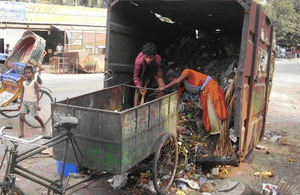DFID Research: Involving the poor in urban development
Can development protect livelihoods of the urban poor?

Waste scavengers and other informal service providers should be considered in urban development projects
The livelihoods of certain groups of urban poor can be adversely affected by the vital development of urban infrastructure and services (I&S). While urban entrepreneurs can benefit from improved service delivery, development which improves infrastructure for a city can also prevent some micro entrepreneurs from pursuing their economic activities, resulting in them losing status and income, and effectively deepening their poverty. For example, improved city solid waste management can lead to decreased access to waste for scavengers, and affect the work of informal sector waste collectors, while piped water provision to urban slums can take away the livelihoods of informal-sector water vendors.
A project funded by DFID and led by Loughborough University’s Water Engineering & Development Centre examined the issues of livelihoods, poverty and infrastructure development.
The researchers reviewed previous studies, and carried out field work in Bangladesh, India, Pakistan and Ethiopia to see how various infrastructure projects impacted on livelihoods of the poor working in the informal sector. In all 4 country studies, a gap was found between declared policy, and the situation in reality: in all instances consultation and accounting for the needs of the poor was considered important and/or legislated, but in reality it was often overlooked. Harmful impacts of urban developments included thousands of rickshaw drivers in Dhaka being adversely affected by the construction of flyovers in the city and the banning of rickshaws from some ‘VIP’ roads, and many traditional fuel enterprises being forced out of business in Ethiopia by development of a ‘modern fuel’ sector providing relatively few unskilled jobs. In contrast, solid waste collection systems in India show how informal-sector enterprises can be involved in the delivery of improved services and contribute to urban development. In this case study, waste-recycling entrepreneurs are now employed by an organised waste collection service, providing an example of how the needs of informal-sector entrepreneurs can be accounted for in development processes.
In summary, the lessons are 2 fold. Firstly, informal sector, predominately self employed individuals with very limited resources - frequently mainly their own physical labour e.g. rickshaw drivers - can suffer from improvements to urban infrastructure. They can become losers for the benefit of other winners. Secondly, any such changes should take account of such possible social impacts and ideally attempt to address them. This project focused on the principal of ‘Livelihood substitution,’ in which new livelihood opportunities created within the delivery of improved I&S can be adopted by those whose livelihoods are adversely affected. Organisations involved in urban I&S planning now have a tool to aid planning for more effective and sustainable projects. Ultimately, the beneficiaries should be informal urban service providers, who can benefit from more secure livelihoods where they can be given a role in continued, and improved, services.